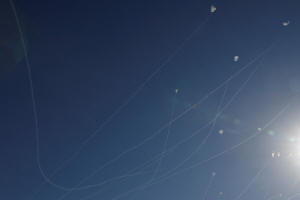Israeli tanks storm back into north Gaza areas where they had withdrawn
 Send a link to a friend
Send a link to a friend
 [January 16, 2024]
By Nidal al-Mughrabi, Arafat Barbakh and Tyrone Siu [January 16, 2024]
By Nidal al-Mughrabi, Arafat Barbakh and Tyrone Siu
GAZA/ISRAEL-GAZA BORDER (Reuters) - Israeli tanks stormed back into
parts of the northern Gaza Strip they had left last week, residents said
on Tuesday, bringing back some of the most intense fighting since the
New Year when Israel announced it was scaling back its operations there.
Massive explosions could be seen over northern areas of Gaza from across
the border with Israel - a rarity over the past two weeks after Israel
announced a draw-down of forces in the north as part of a transition to
smaller, targeted operations.
The rattle of intense gunfire carried across the border through the
night. In the morning, contrails snaked through the sky as Israel's Iron
Dome defences shot down rockets fired by militants across the fence,
proof they retain the capability to launch them despite more than 100
days of war.
Israel said its forces had killed dozens of Hamas fighters overnight in
clashes in Beit Lahiya on the northern edge of the Gaza Strip. Gaza
health authorities said the last 24 hours of Israeli bombing had killed
158 people in the enclave, raising their toll for the war, now in its
fourth month, to 24,285, with thousands more bodies feared lost in the
rubble.
Israel launched the war to eradicate Hamas after militants stormed
across the border fence on Oct. 7, killing 1,200 people and capturing
240 hostages. The war has driven nearly all Gazans from their homes,
some several times, and caused a humanitarian crisis, with food, fuel
and medical supplies running low.

Under pressure from Washington to reduce civilian casualties, Israel had
said it was shifting tactics, transitioning from a full-scale ground
assault to targeted operations against the Hamas militants that control
the enclave.
It began that shift with a pullback in the north, where its forces had
begun their ground offensive in October. On Monday evening, Defense
Minister Yoav Gallant also said the more recent ground assault in the
south was drawing to a close.
But any path toward de-escalating the war still seems remote, with
Israel saying it will not halt until Hamas is destroyed, and the
fighters showing no sign of losing the ability to resist. Israeli
officials said Hamas rockets hit an electronics shop in southern Israel
on Tuesday morning. There were no immediate reports of casualties.
Some of the hundreds of thousands of residents who fled the north
earlier in the war had begun returning last week to bombed-out areas
where the Israelis had withdrawn. But residents who spoke to Reuters on
Tuesday said the abrupt resurgence of fighting in the north would now
halt plans to try to go home.
[to top of second column]
|

Israel's Iron Dome anti-missile system intercepts rockets launched
from the Gaza Strip, amid the ongoing conflict between Israel and
the Palestinian Islamist group Hamas, in southern Israel, January
16, 2024. REUTERS/Tyrone Siu

"We almost planned to return to our house in Nazla, east of Jabalia,
but thank God we didn't. This morning people living nearby arrived
here and told us the tanks pushed back there," said Abu Khaled, 43,
a father of three now living with relatives in severely damaged Gaza
City.
"The sounds of bombing from the tanks, from the planes didn't stop
all night. It reminded us of the first day of the ground incursion,"
he said. "I will only believe tanks are out when a ceasefire
agreement is announced."
'FORGIVE ME, MY SON. I COULD NOT PROTECT YOU'
In the south of the enclave, Israeli forces have fought their way to
the centre of the main southern city Khan Younis, and into towns
north and east of the central city of Deir al-Balah.
Defense Minister Gallant's announcement on Monday that the major
ground offensive in the south was soon coming to an end raises the
question of whether the Israelis will still try to advance into the
remaining southern areas.
Most of Gaza's 2.3 million people are now crowded into the few
southern areas that Israeli troops have yet to enter, including Deir
al-Balah and Rafah, which is located on the southern edge of the
strip.
In Khan Younis, Zaher Abu Zarifa wept and cradled a black plastic
body bag holding his seven-year-old son Saif, one of at least 11
bodies brought out at a hospital morgue.
The boy was killed, his father said, by a missile while playing on a
bicycle by a school gate. Later, by a small freshly dug grave, a
gravedigger unzipped the bag so the father could kiss the boy's
face, then zipped it back up, took the boy and gently laid him in
the ground.
"Forgive me, my son. I could not protect you," the father repeated.
"Forgive me, my son. I could not protect you."
In Rafah, residents were combing the rubble of the house of the Ibn
Germy family, which had been bombed overnight.
"What is their fault? They were having dinner, we want peace not
war," said neighbor Salem al-Loulahy.
(Reporting by Nidal al-Mughrabi in Doha, Arafat Barbakh in Gaza and
Tyrone Siu at the Gaza-Israel border, southern Israel; Writing by
Peter Graff; Editing by Sharon Singleton)
[© 2024 Thomson Reuters. All rights reserved.]This material
may not be published, broadcast, rewritten or redistributed.
Thompson Reuters is solely responsible for this content.
 |